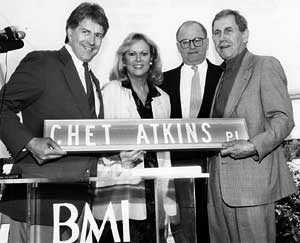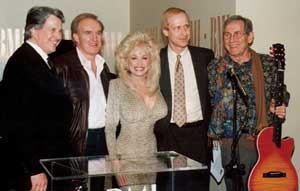BMI Salutes Chet Atkins
| BMI songwriter Chet Atkins, known as ''Mr. Guitar'' and considered the most-recorded solo instrumentalist in music history, died at his Nashville home on Sunday, July 1 after a long battle with cancer. He was 77. A BMI songwriter since 1958 with over 200 songs in his repertoire, Atkins was widely known and admired by the general public as a master guitarist and at the same time played a less visible role behind the scenes as a musician, producer and record executive. |
 |
Born in the hills of Tennessee, Chet Atkins first came to the public’s attention as a member of the band that accompanied the Carter Sisters and Mother Maybelle. Their appearances on the “The Carter Family and Chet Atkins Show” on KWTO of Springfield, Missouri were so successful that the program was nationally syndicated. This degree of visibility led Atkins to begin recording on his own for RCA Records in 1946 and to move to Nashville in 1949. There, he joined a group of studio players who are now associated with some of the most successful country recordings of all time. They include pianist Floyd Cramer and guitarist Grady Martin, as well as back-up groups the Jordanaires and the Anita Kerr Singers.
 Atkins (right) is seen here in 1991 at the BMI-hosted dedication party of "Chet Atkins Place" on Music Row, only the second person (Roy Acuff was the first) to be honored with a namesake street. Presenting him with the framed street sign are BMI's Harry Warner and Joyce Rice, and former BMI VP Roger Sovine. |
Atkins also showed himself to be a skillful recording studio manager. When Steve Sholes became head of RCA A&R in 1957, he put Atkins in charge of the Nashville operation. At that time, the rise of rock & roll had eroded country’s popularity with the public. Atkins helped country music recover its prominence by a skillful reconfiguration of its instrumentation. A smoother sound more dependent upon strings and vocal chorus took the place of steel guitars and fiddles. While some fussed that these practices eroded country’s authenticity, others admired Atkins’s progressive tendencies and business savvy. He never thought of country music as something fixed or unalterable. As he stated, "After I’d had a few hits, I would just draw on chord changes I’d learned in jazz and things I’d heard in gospel and classical music - bass lines, chords and such. And I’d just ad those influences when I felt like it. No one knew the difference, and sometimes we got some great sounds that way."
 At a 1993 ceremony unveiling a new Chet Atkins model from Gibson Guitars: BMI's Harry Warner, Ralph Emery, Dolly Parton, Gibson's Henry Juskiewicz and Chet Atkins. photo: Alan Mayor |
While he set standards as a producer and executive, Atkins continued to record a steady stream of instrumental recordings. He particularly liked to work in tandem with another performer and laid down sides with Jerry Reed, Mark Knopfler and his idol, Merle Travis. Country music, if not American music altogether, would not and will not be the same without him.






Community
Connect with BMI & Professional Songwriters